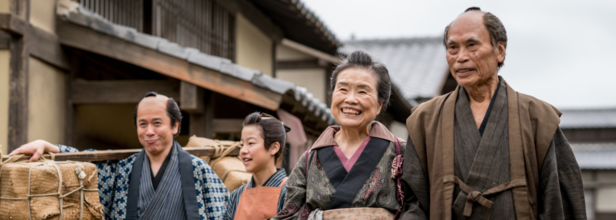- Health Conditions A-Z
- Health & Wellness
- Nutrition
- Fitness
- Health News
- Ayurveda
- Videos
- Medicine A-Z
- Parenting
- Web Stories
What Is The 'Japanese Way' Of Leading A Healthy Life?

Credits: Canva
If one has to look at the data of old-age dependency ratio, Japan, very clearly stands as an outlier. Whether or not it is great for their economy, the truth one cannot deny is the healthy lifestyle they swear by, which has enabled a longer life expectancy. It is in Japan where this ratio is highest in the world, which means people older than 64 are living a long life.
Dr Martin Juneau, MD, FRCP, writes that among the G7 countries, Japan has the highest life expectancy at birth. For Japanese men, the average age is 81.1, whereas Japanese women live up to an average age of 87.1 years.
The reason, Juneau writes, is because of fewer deaths from ischemic heart disease and cancers, particularly breast and prostate cancer, which is common among women and men at an older age, respectively.
Japan’s low mortality rate is largely due to a diet low in red meat, rich in fish, soy, tea, and a notably low obesity rate—4.8% in men and 3.7% in women. In contrast, Canada’s 2016 obesity rates were 24.6% for men and 26.2% for women. Obesity raises the risk of heart disease and several cancers.
It is thus no surprise that Japan makes it to the list Blue Zones, a termed coined by author Dan Buettner, who studied the areas of the world where people lived exceptionally long lives. He called them the "Blue zones", because when Buettner and his colleagues were searching for these areas, they drew it with a blue circles around them on the map.
Japan's Okinawa is one of the five regions that makes it to the list.
So, how do Japanese stay healthy?
The Japanese Walking
Also known as Interval Walking Training or the Japanese Walking is a safe and sustainable way to improve your fitness without going to the gym.
It is developed by Japanese researchers to target cardiometabolic health in older adults, IWT blends short bursts of brisk walking with periods of slower recovery walks — making it an ideal choice for people across age groups and fitness levels.
Unlike traditional walking, which is usually done at a steady pace, IWT alternates between fast and slow intervals. The recommended protocol involves five sets of 3 minutes of brisk walking followed by 3 minutes of slower walking, totaling 30 minutes of exercise. This is typically done five days a week.
Vinegar Before Meals
Japanese people have made it a habit to drink vinegar before every meal as a healthy tonic. On an average, a Japanese person drinks 15 to 30 ml, which is around 1 to 2 tablespoons of vinegar. They dilute it in water right before the meal.
Vinegar contain acetic acid that helps in increasing the production of digestive enzymes and stomach acid. This can also help break down food more effectively. There are studies too that show that acetic acid can improve insulin sensitivity and reduce blood sugar spikes that happens right after you consume your meal.
There are other benefits to drinking vinegar. It also helps to boost your metabolism and promote weight loss. Research also suggests that acetic acid can increase fat burning and reduce fat storage.
A Healthy Routine
Japanese people are known for following a healthy routine. It does not have to be rigorous, but what is important for them is the consistency with which you follow it.
Some of the habits they follow as a day-to-day life are:
- Picking fresh from the market
- Using different methods of hydration, including drinking tea, which fulfills the intake of antioxidants
- In Japan, skincare is not luxury, they pay special attention to hydrating their skin
- Prioritising sleep
- Eating fermented food that keeps their guts healthy
Eating Habits
The Okinawan mantra to a healthy diet is Hara Hachi Bu, which stands for eating only 80% of your diet. It was founded 2500-year ago by Confucianism. It is said before the meal to remind people to stop eating when they are stomach are 80% full. The study mentions that the "20% gap between not being hungry and feeling full could be the difference between losing weight or gaining it." The study by Buettner also found that the people in the Blue Zones eat their smallest meal in the late afternoon or early evening, and then, they do not eat any more the rest of the day.
Reiki Healing
While it is not to be substituted as a cure to diseases or illness, or even as a therapy, this complementary therapy can be used alongside conventional medical treatments.
It is a Japanese form of energy healing where practitioners channel universal life force energy to promote relaxation, reduce stress, and potentially aid in healing. It involves placing hands lightly on or near the body to transfer this energy, aiming to balance the body's energy and facilitate well-being. Reiki is considered a complementary therapy, not a replacement for conventional medical treatment.
Do You Feel Drained No Matter How Much You Sleep And Rest?

Credits: Canva
It’s 2 PM, and despite having slept a full eight hours the night before, you find yourself reaching for that third cup of coffee just to stay awake. The afternoon slump is familiar to many, but what if this persistent tiredness isn’t just a passing phase? What if you feel exhausted all day, no matter how much rest you get? This chronic fatigue can be frustrating and confusing, leaving you wondering why your body won’t recharge even when you’re resting.
Fatigue is more than just feeling sleepy. It’s a complex state that affects both body and mind, often blurring the lines between physical exhaustion and mental weariness. Many people experience occasional tiredness, but when fatigue becomes a constant companion, it signals that something deeper may be at play. Understanding why you’re tired even when you’re resting—and how to address it naturally—can transform your energy levels and overall well-being.
This kind of persistent fatigue—especially when it lingers even after a full night’s rest—has become increasingly common in today’s fast-paced, always-connected lifestyle. And while an “afternoon slump” is a known phenomenon, more and more people are grappling with all-day exhaustion. The big question: Why are so many of us tired all the time?
Tired vs. Fatigued: What’s the Difference?
It’s important to distinguish between simple tiredness and fatigue. Feeling sleepy after a long day or a restless night is expected. That’s sleepiness—a short-term issue that’s usually remedied with adequate rest.
Fatigue, on the other hand, is deeper and more persistent. According to experts, fatigue is more than just feeling sleepy—it’s a state of constant physical and mental exhaustion that doesn’t resolve with sleep. It can often be a sign of an underlying issue—either lifestyle-related or medical.
“Physical and mental fatigue are different, but they often occur together,” explains Dr. Pooja Singh, Sports & Fitness Specialist. “Chronic tiredness is not something to normalize—it’s your body asking you to pause and reflect.”
Why Are You Always Tired?
A surprisingly large portion of ongoing fatigue can be traced back to everyday habits. According to data, 1 in 3 adults in the U.S. don't get enough sleep, despite the recommended 7–8 hours per night. But even those logging decent sleep hours can feel drained. Sometimes, it’s the well-known “afternoon slump” caused by natural dips in circadian rhythm. Here’s why:
1. Poor Sleep Hygiene
Many people underestimate how profoundly sleep quality affects daily energy. Tossing and turning, late-night screen time, or simply going to bed at inconsistent hours can disrupt sleep cycles.
“Eating real food and supplementing with magnesium and vitamin D—especially through effervescent tablets—can improve sleep quality significantly,” says Dr. Singh. “Small nutritional tweaks go a long way.”
2. Sedentary Lifestyles
We now know that sitting is the new smoking. Modern work and leisure habits often mean we’re sitting for hours without a break, which affects circulation, mental focus, and yes—sleep.
“Start moving in between your day,” Dr. Singh advises. “You don’t need a gym. Basic moves like calf raises, squats, shoulder shrugs every 30–40 minutes can reset your energy levels.”
3. Screen Time Overload
If your bedtime routine includes scrolling social media or watching Netflix in bed, you’re disrupting your circadian rhythm. Screens emit blue light, which tricks the brain into thinking it’s daytime.
“Try meditating or doing deep breathing exercises for 20–30 minutes before bed instead,” Dr. Singh recommends. “This calms your nervous system and improves sleep quality.”
Is There a Medical Reason You’re Always Tired?
Sometimes, the root of constant fatigue runs deeper than lifestyle.
Conditions like anemia, thyroid imbalances, diabetes, chronic fatigue syndrome, and sleep apnea can all manifest as chronic tiredness. Mental health conditions—especially anxiety and depression—are also significant contributors to low energy levels.
“It’s important to note that if basic lifestyle interventions don’t help, consult a doctor,” Dr. Singh emphasizes. “Your fatigue could be a symptom of something more serious.”
Keep a diary of your sleep patterns, energy dips, and emotional states. This can help doctors identify patterns and offer targeted treatments.
Natural Ways To Fix Your Fatigue
Thankfully, there are several science-backed strategies to restore energy—without relying on caffeine or sugar.
Improve Sleep Quality
Good sleep isn’t just about quantity, but consistency. Stick to a sleep schedule, reduce screen time before bed, and create a calming bedtime ritual. Choose natural sleep aids like magnesium and herbal teas if needed.
Move More, Sit Less
Even light movement boosts circulation and releases endorphins. If you can’t squeeze in a gym session, take a brisk walk or stretch for 10 minutes. Exercise increases oxygen flow and mitochondrial efficiency—your cells’ natural energy factories.
Step Into the Sun
Just 10–15 minutes of sun exposure daily can help your body produce vitamin D, a deficiency of which is linked to fatigue. Light exposure also helps reset your circadian rhythm, making you more alert during the day and sleepier at night.
Balance Your Meals
High-carb lunches can spike insulin and lead to energy crashes. Opt for protein- and fiber-rich meals to maintain stable blood sugar and mental clarity throughout the day.
“Supplementing with collagen (type 2) is great for joint-muscle health, especially if fatigue stems from physical pain or weakness,” adds Dr. Singh.
Practice Stress Management
Chronic stress leads to cortisol dysregulation, which drains your body over time. Use meditation, yoga, journaling, or nature walks to bring stress hormones back to balance.
Chew Gum (Yes, Really!)
Studies show chewing gum can improve alertness and cognitive performance. It’s a simple, effective brain boost—especially during work or study sessions.
Nap Smartly
A power nap of 15–30 minutes can recharge your brain. Avoid longer naps which may disrupt your night sleep cycle and leave you groggier.
Fatigue isn't always a sign of laziness or poor time management—it’s often a whisper from your body (or sometimes, a scream) that something needs attention. In a world that praises busyness, acknowledging tiredness as a valid and treatable state is a radical act of self-care.
From smart nutrition and movement to emotional well-being and medical check-ins, fighting fatigue naturally is not just possible—it’s essential. And remember: you don’t need to fix everything overnight. Small, consistent changes create long-lasting energy shifts.
As Dr. Singh puts it, “Your body is incredibly intelligent. The more in sync you are with its signals, the more resilient, vibrant, and rested you’ll feel.”
Dr. Pooja Singh is a Sports & Fitness Specialist at Fast&Up in India
Drinking Coffee Can Lower Your Risk Of Early Mortality With These 2 Changes

(Credit-Canva)
Drinking coffee every morning is a sacred ritual for many people. It gives them the energy to start their day as well as the boost they need through midday etc. Coffee often gets credit for waking us up, but it's also been linked to a lower risk of type 2 diabetes, heart disease, and even a longer life. However, new research suggests that how you drink your coffee might determine whether you actually get these health benefits.
While people have their own preferences of how they like their coffee, new research shows that having it a certain way can make it worse for your health, rather than helping you.
Black Coffee for Better Health
A recent study found that people who drank one to two cups of coffee daily had a 14% lower risk of dying compared to those who didn't drink coffee. But there's a catch: this was only true for individuals who drank their coffee black or with just small amounts of cream, milk, or sweeteners. Adding too many extra ingredients seemed to cancel out coffee's positive effects.
Coffee Habits and Life Expectancy
This study, published in The Journal of Nutrition, followed over 46,000 adults in the U.S. for about 10 years. Researchers wanted to see if there was a connection between how people drank coffee and their risk of death.
At the beginning, participants filled out a survey about their diet for over 24 hours. From this, researchers estimated their usual coffee intake and noted if they added sweeteners or high-fat products. After tracking participants' health (including deaths from cancer, heart disease, and all other causes), the team found:
- Drinking one cup of coffee daily was linked to a 16% lower risk of death from any cause.
- Drinking two or three cups daily cuts this risk by 17%.
- Coffee drinkers also had a significantly lower risk (29–33%) of dying from heart disease.
When looking at additives, people who drank black coffee or coffee with low amounts of added sugar and saturated fat had a 14% lower risk of overall mortality compared to non-coffee drinkers. "Low added sugar" meant less than 2.5 grams (about half a teaspoon) of sugar, syrup, or honey per 8 ounces. "Low saturated fat" meant less than 1 gram (about 5 tablespoons of 2% milk or 1 tablespoon of light cream/half-and-half) per 8 ounces.
Why Additives Might Reduce Benefits
Coffee contains over 100 different molecules, including polyphenols, which are likely responsible for many of its health benefits. Polyphenols are antioxidants that help reduce inflammation and protect cells from damage. This makes the link between coffee and lower mortality "biologically plausible," as coffee is a major source of antioxidants for many.
Adding sugar or saturated fats to your coffee doesn't necessarily destroy these polyphenols. Instead, a high intake of sugar and saturated fats in general is simply linked to worse heart health and a higher risk of death.
Making the Most of Your Coffee
Since this is the first study to specifically look at how coffee additives affect mortality risk, the evidence isn't yet strong enough for strict recommendations. However, a good general rule is to reduce your overall consumption of sugar and saturated fat.
If you enjoy a little cream and sweetener in your coffee, don't worry too much. While black might be better, adding small amounts doesn't necessarily put you at increased risk.
Regardless of additives, moderation is key. The health benefits of coffee tend to decrease after about two cups daily, and drinking too much can even be harmful. High doses of caffeine can cause anxiety, irregular heartbeats, and elevated blood pressure.
Dementia Writing Test That Reveals Early Signs Of Cognitive Decline

(Credit-Canva)
Losing one’s sense of self, the way they think or even remember things are all part of the cognitive degenerative disease known as dementia. It is an umbrella term that is used to define memory, language, problem-solving and other thinking abilities that can be so severe that it interferes with our daily life.
Although there have been many researchers and focused studies conducted on dementia, there is still a lot we do not know about the disease like what causes it and how to cure it. While there are many risk factors associated with it, there is a sense of uncertainty surrounding it. The reason why it is important to know the early symptoms of the disease is because recognizing and getting the disease diagnosed early can help the patients receive early treatment and better their symptoms. Many times, these symptoms are unrelated to the disease itself. One such sign is – changed or bad handwriting.
How Your Handwriting Indicates Dementia
According to a 2020 study published in the Wiley Online Library, changes in handwriting, or suddenly having bad handwriting, can be an early hint of dementia. These changes, such as shaky writing, difficulty forming letters, and problems with spelling and grammar, might appear years before more obvious symptoms lead to a diagnosis.
Having trouble with reading and writing, especially if it's new for the person, often signals dementia. This might be noticed in everyday things, like a change in how birthday cards are written.
Other Changes Related To Dementia
Shifting Tastes and Sensory Issues
According to the Alzheimer’s Society other less-known signs include not enjoying favorite foods anymore. Sensory issues are not always recognized as dementia symptoms and are often not reported. These could include increased sensitivity to noise, changes in how smells are perceived, and alterations in how food tastes, which might make a loved one dislike foods they once enjoyed.
Changes in Walking (Gait)
According to Neuropsychiatric Disease and Treatment journal, changes in how someone walks, like shuffling their feet, could also be an early symptom. Individuals with dementia are more prone to trips and falls. This can be because they might start to struggle with understanding space and judging distances, which affects how they move around their surroundings.
Using the Wrong Words
Another symptom that has been highlighted is using the wrong word in a sentence, according to Alzheimer’s society. Struggling to find the right words is a lesser-known sign of dementia. This can look like stuttering when trying to speak, stopping sentences halfway through, or mixing up similar words (like saying "jumper" instead of "jacket"). This difficulty is called 'aphasia' and can affect both general words and people's names.
Frequent Lateness
The final symptom that often goes unnoticed is consistent lateness, which can be connected to problems reading clocks. Losing track of time can be an early sign of dementia that is sometimes missed. A clear indicator of this symptom is when a person starts being late for appointments and social gatherings. This can be due to memory loss or the inability to read an analog clock anymore.
© 2024 Bennett, Coleman & Company Limited

